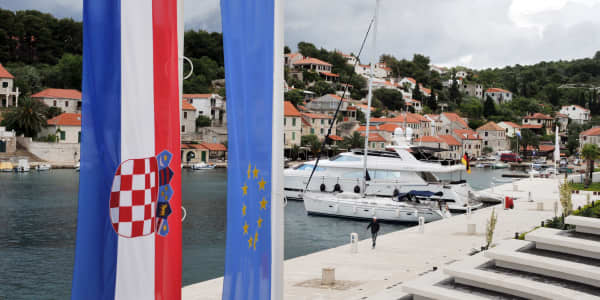Croatia's pristine beaches, clear seas and warm weather meant that it wasn't long before tourists returned after the 1991-1995 independence war. Now, in the face of booming tourism, the country is faced with something of a dilemma: how to build on its natural assets without spoiling them.
"Croatia has this beautiful coastline and nice weather—it is like a natural resource they have. Norway has oil and Croatia has coastline. They should do everything they can to exploit it," William Bartlett, an academic specializing in south-east Europe at the London School of Economics (LSE) told CNBC.
Tourism is now Croatia's largest industry, accounting for 12.1 percent of gross domestic product (GDP) last year. This is seen rising to 17.1 percent over the next 10 years.
Around 12.9 million tourists visited last year, with the country a hotspot for holidaymakers from Germany and nearby Italy and Slovenia (another Yugoslav successor state), as well as Russians and other Europeans.
The government hopes tourism will help Croatia recover from a near six-year recession, and plans to invest 7 billion euros ($9.5 billion) in the industry by 2020, creating up to 32,000 jobs.
New Balearic Islands?
There are doubts, though, about the expansion underfoot, with the high-rise sprawl of Spanish resorts like the Costa Brava illustrating the perils of ill-development.
Read MoreMeet sluggish Club Med's easterly member: Croatia
"We have to preserve all this beauty, but also turn it into money. If it is all concrete, we are going to have a new Balearic Islands of Spain—that is not the nicest spot. I have been there and would not like to repeat the experience," said Emil Tedeschi, the CEO of Atlantic Grupa, a Croat multinational consumer goods company.
He said that massive sums had been spent on building hotels, but not on necessary infrastructure like water and sewage systems, nor the marinas and petrol stations needed for yachts.
"I would stop all building for two years, and just spend it thinking, planning and designing," Tedeschi added.
Rather than building more hotels, Croatia should work to boost occupancy rates by extending the tourist season beyond high summer, said Ivica Mudrinic, head of the Croatian Employers' Association and a senior vice-president at Deutsche Telekom.
Mudrinic told CNBC that outdoor sports like cycling, hiking and rafting could boost tourism when temperatures were milder.
"If you are able to utilize existing hotel infrastructure, you are talking about a significant increase in revenues," he said.
Tedeschi, meanwhile, suggested "culinary tourism" as a possible alternative, touting the success of Spain's rainy Basque region in attracting visitors.
"This part of Spain was not the top tourist spot, but it became a big destination because of gastronomy," Tedeschi said.
'Highly exposed'
LSE's Bartlett noted that Croatia's dependence on tourism left it highly exposed to downturns in the economic cycle, particularly in Europe.
"Croatia could smooth that cycle by making better use of its tax revenue to provide incomes in periods when the tourism industry is weak," he said. "That is a question of managing public finances better."
He added that Croatia could also try levying extra tourist taxes. A daily visitor tax is already in place, varying between 3.5 kunas-7.0 kunas ($0.63-$1.26) depending on location and time of year.
"You already get a quite a lot of tourism in places like Dubrovnik, where floods of people come off cruise ships and cause people jams—the government could impose a high congestion charge," Bartlett said.
—By CNBC's Katy Barnato in Zagreb, Croatia




